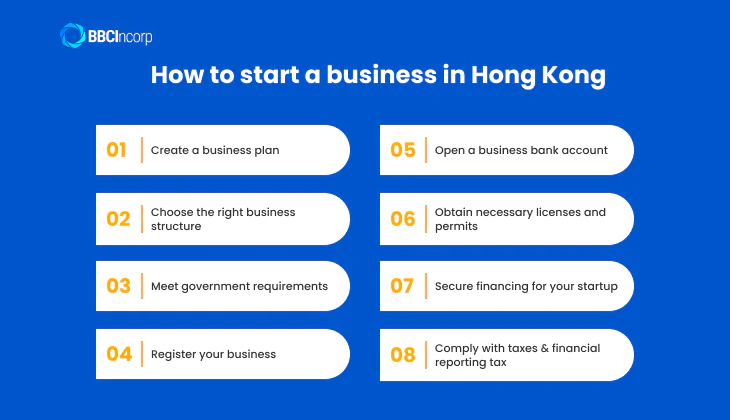
- Why start a business in Hong Kong?
- How to start a business in Hong Kong: Step-by-step
- Step 1: Create a business plan
- Step 2: Choose the right business structure
- Step 3: Meet government requirements
- Step 4: Register your business
- Step 5: Open a business bank account
- Step 6: Obtain necessary licenses and permits
- Step 7: Secure financing for your startup
- Step 8: Comply with taxes & financial reporting tax
- Obtaining a Visa to start a business in Hong Kong
- Additional resources for entrepreneurs in Hong Kong
- Start up business in Hong Kong with BBCIncorp
- Conclusion
Hong Kong continues to solidify its status as one of the world’s premier business hubs, offering unrivaled access to the Asia-Pacific market and beyond. In 2024 alone, 1,079 new non-Hong Kong companies were established, and by year’s end, the total number climbed to 15,126, marking a 2% increase over 2023(1). These figures prove that Hong Kong is a prime business hub for foreigners.
Moreover, entrepreneurs are increasingly drawn to Hong Kong for its low tax regime and efficient regulatory framework. The city’s robust infrastructure and business-friendly policies make it an attractive destination for startups and established enterprises alike.
However, before diving in, it’s crucial to understand the process of how to start a business in Hong Kong. This guide provides a comprehensive overview to help you embark on your entrepreneurial journey in Hong Kong with confidence.
Why start a business in Hong Kong?
Hong Kong offers unmatched access to Asia’s markets, low taxes, and a world-class business environment. Below, we clearly define all the reasons why it’s the ideal place to start a business and the challenges your venture may confront.

Advantages of starting a business in Hong Kong
Hong Kong offers a range of compelling advantages for businesses, making it a top destination for entrepreneurs and investors as follows:
- Attractive tax regime: Hong Kong offers a two-tiered profits tax system. The first HKD 2 million of profits are taxed at 8.25%, and profits exceeding this threshold are taxed at 16.5%(2). Additionally, businesses in Hong Kong do not have to pay Value Added Tax (VAT), sales tax, or taxes on offshore income, making it a favorable environment for investors.
- Access to Mainland China & Asian Markets: Hong Kong serves as a strategic gateway to Mainland China and other key Asian markets. Its unique position allows businesses to leverage the “one country, two systems” framework, facilitating smoother cross-border operations.
- Supportive startup ecosystem: The Hong Kong government actively supports startups through various programs. For instance, Cyberport offers funding and resources to digital startups, while the Innovation and Technology Fund provides financial support for technology development.
- Skilled workforce & infrastructure: Hong Kong is home to a highly educated labor force, particularly skilled in Artificial Intelligence (AI) and automation. The Hong Kong International Airport is a leader in cargo, and the city’s public transport system is efficient and well-connected. It also offers high-speed internet and excels in logistics with advanced ports and cargo facilities. Regional connectivity is enhanced by the Express Rail Link and Hong Kong-Zhuhai-Macao Bridge.
Challenges of starting a business in Hong Kong
While Hong Kong is a global business hub, there are several challenges that new entrepreneurs should be aware of, including:
- Strict corporate banking requirements: Due to stringent anti-money laundering (AML) regulations, foreign entrepreneurs may face delays or rejection when opening a corporate bank account. Most banks require in-person verification and detailed documentation.
- Work visa limitations: Foreigners must prove they possess skills that are not readily available locally or meet investment thresholds to obtain a business or employment visa.
- Highly competitive and saturated market: Key sectors like finance, trading, and consulting are already crowded, making it difficult for new businesses to gain traction without a unique value proposition.
- High operational costs: Office rental and living expenses in Hong Kong are among the highest in Asia, affecting startups with limited budgets.
- Cultural and language barriers: Although English is common in business, understanding Cantonese and local customs is important for smoother communication and market integration.
How to start a business in Hong Kong: Step-by-step
If you’re planning to launch your company in Hong Kong, understanding how to start a business the right way is essential. This clear guide walks you through each stage to ensure a smooth setup.

Step 1: Create a business plan
In Hong Kong, a comprehensive business plan is vital for attracting investors, securing funding, and meeting legal requirements for business registration. You must define your business goals, mission, and vision, ensuring clarity in your direction. Moreover, a well-structured plan also includes financial projections and marketing strategies tailored to Hong Kong’s unique business landscape.
Step 2: Choose the right business structure
The structure you select will affect your legal responsibilities, taxes, and operational flexibility. The most common business structures in Hong Kong include:
- Private Limited Company is the most popular choice due to its limited liability protection, meaning personal assets are not at risk if the business faces debts. It also offers scalability and the ability to attract investors.
- Sole Proprietorship is simpler to establish but exposes the owner to full liability, meaning personal assets are at risk in case of business failure.
- Partnership involves shared responsibility but also exposes partners to joint liability for business debts.
Before making a decision, it’s essential to evaluate business goals, risk tolerance, and investment needs. If unfamiliar with Hong Kong’s regulations, consulting a professional can ensure the best structure is selected for your specific requirements.
Step 3: Meet government requirements
To operate smoothly, avoiding unnecessary legal hassle in the future, meeting the government’s legal requirements is a crucial next step. Businesses must complete a few key factors:
- Hiring a local company secretary: Hong Kong law requires all companies to appoint a company secretary according to Section 474 of the Companies Ordinance. The company secretary plays a crucial role in maintaining company records, ensuring compliance with legal obligations, and filing necessary documents with government authorities.
- Establishing a registered business address: As per Sec. 658 of the HKCO, every business must have a physical address in Hong Kong for official communication. This address will be used for receiving legal notices and business correspondence.
- Reserving a unique company name: It’s necessary to choose a business name that is distinct and complies with local guidelines. The name must not be identical to any existing business and must avoid prohibited terms. Businesses can search the Integrated Companies Registry Information System (ICRIS) to confirm name availability before proceeding with registration.
Step 4: Register your business
To formally establish a company in Hong Kong, you must submit the required incorporation documents to the Companies Registry through the e-Services Portal or in person at the office, which include:
- An Incorporation Form (Form NNC1 for companies limited by shares or Form NNC1G for those not limited by shares)
- A copy of the company’s Articles of Association
- A Notice to the Business Registration Office (IRBR1).
Once your company is successfully registered, you will receive the Certificate of Incorporation, which formally establishes your business as a legal entity.
In addition, obtaining a Business Registration Certificate (BRC) is mandatory for all businesses operating in Hong Kong. This certificate is issued by the Inland Revenue Department (IRD). You can apply online via the e-Services Portal or submit in person at the IRD with the following documents:
- Incorporation Form, a copy of Articles of Association, Notice to Business Registration Office (IRBR1) for local companies.
- Notice to Business Registration Office (IRBR2) for non-Hong Kong businesses.
- IDs or passports of owners/partners for Sole Proprietorships/Partnerships.
*Note:
For online applications, certificates are typically issued within an hour, while paper applications take about four working days.
Step 5: Open a business bank account
Hong Kong bank account allows you to legally manage business finances, including receiving payments, making transactions, and fulfilling tax obligations. More importantly, having a dedicated business account ensures financial transparency and helps your company comply with local regulatory requirements.
When selecting a bank, consider your company’s needs. Some banks may offer more flexibility for startup businesses, while others provide extensive international services. Smaller banks may be more accommodating if you have a solid business plan but lack local financial history.
Because of its strict compliance policies, it’s advisable to contact banks in advance, compare requirements, and confirm the onboarding process.
To open an account, prepare essential documents such as:
- Certificate of Incorporation.
- Business Registration Certificate (BRC).
- Articles of Association.
- Proof of identity for directors and shareholders (e.g., passport, Hong Kong ID).
- Proof of address (e.g., utility bill or bank statement).
Step 6: Obtain necessary licenses and permits
Depending on your business type, you may need industry-specific licenses such as food and beverage permits, import/export certificates, or health and safety approvals. To get accurate information on required licenses, follow these steps:
- Visit the Business Licence Information Service (BLIS) portal.
- Use the search function to identify licenses based on your business type, product, or service.
- Review the listed requirements and application procedures for each license.
- Submit your application through the appropriate government department as guided
Step 7: Secure financing for your startup
Startup businesses
in Hong Kong have access to various funding sources such as personal savings, bank loans, angel investors, and venture capital. Each option has its own benefits and requirements. In addition, the Hong Kong government offers several financial support schemes:
- Innovation and Technology Fund (ITF): designed for businesses in tech and innovation sectors.
- SME Loan Guarantee Scheme: helps small and medium enterprises access bank loans without requiring substantial collateral.
To increase the chances of securing funding, entrepreneurs should prepare a clear business plan, detailed financial forecasts, and a compelling pitch. This preparation demonstrates professionalism and builds confidence among investors or funding agencies.
Step 8: Comply with taxes & financial reporting tax
In Hong Kong, businesses are legally required to meet ongoing and financial reporting obligations. Proper compliance ensures smooth operations and avoids penalties. Below are the key requirements:
- File the Annual Return with the Companies Registry to keep company details up to date.
- Maintain accurate and complete accounting records in accordance with the Companies Ordinance.
- Prepare and submit audited financial statements annually.
- File the Profits Tax Return with the Inland Revenue Department (IRD) on time.
- Pay Profits Tax 16.5% for corporations, 15%(3) for unincorporated businesses.
- Pay Salaries Tax if you employ staff.
- Pay Property Tax if your business owns property in Hong Kong.
- Engage a certified public accountant (CPA) for reliable financial reporting and compliance support.
Obtaining a Visa to start a business in Hong Kong
Foreigners can establish a business in Hong Kong without needing a visa or residency. However, if you intend to live and work in the city, you must apply for a suitable visa. Several visa categories support entrepreneurial and professional activities:

- Entrepreneur visa (also known as the Investment Visa): For those planning to establish or join a business in Hong Kong. You must demonstrate a solid business plan, sufficient funds, and potential to contribute to the local economy.
- General Employment Policy (GEP) visa: For professionals employed by a Hong Kong company. A confirmed job offer and relevant qualifications are required.
- Top Talent Pass Scheme (TTPS): For high-income individuals or graduates from top universities. No job offer is needed.
Applications can be submitted online via the https://www.immd.gov.hk or in person, including the following documents:
- A detailed business plan
- Proof of sufficient capital
- Academic or professional qualifications
- Relevant work experience
*Note:
Supporting documents must be in English or Chinese, with certified translations if required. Processing time usually ranges from 4 to 8 weeks. If approved, you may also sponsor dependents under certain conditions. Each visa type has specific requirements, so reviewing official guidelines or consulting a legal advisor is recommended to ensure compliance.
Additional resources for entrepreneurs in Hong Kong
Hong Kong offers a supportive environment for entrepreneurs, with a range of resources to help launch and grow businesses efficiently.

Startup Accelerators and Incubators
- Cyberport is a digital tech hub wholly owned by the HKSAR Government, supporting over 2,200 startups with resources in AI, fintech, and digital innovation, offering incubation, funding, and global expansion support.
- HKSTP (Hong Kong Science and Technology Parks Corporation) is a statutory body that fosters a dynamic innovation and technology ecosystem by supporting startups, connecting industry players, and nurturing tech talent.
Government Tools and Support Services
- InvestHK offers free consultation and assistance with business setup for both local and foreign entrepreneurs.
- The SME Centre under the HKTDC provides access to market information, training programs, and various funding schemes to help small businesses grow effectively.
- The Companies Registry allows for quick company registration and guides legal compliance.
Networking and Business Communities
- StartmeupHK Festival by InvestHK offers overseas startups enter Hong Kong with ecosystem insights, networking opportunities.
- RISE connects startups with investors, mentors, and industry peers.
- The Hong Kong General Chamber of Commerce advocates for businesses, offers networking, hosts 500+ annual events, and provides services like certification, training, and venue rental.
- Federation of Hong Kong Industries offers ongoing business development opportunities, policy updates, and training sessions.
Start up business in Hong Kong with BBCIncorp
BBCIncorp offers a streamlined and tech-enabled solution for entrepreneurs looking to establish their business in Hong Kong. By utilizing innovative tools, we simplify the incorporation process, allowing business owners to focus on growth while we handle the administrative details.
We provide end-to-end services for company incorporation in Hong Kong, including:
- Company Formation: Expert guidance to help you choose the most suitable company structure, such as limited liability company or sole proprietorship meet your needs.
- Company Secretary Services: Assistance with adhering to local corporate governance regulations, ensuring compliance with Hong Kong laws.
- Local Registered Office Address: Meets legal requirements and enhances your business’s credibility in the region.
- Virtual Office Solutions: Establish a presence in Hong Kong with services such as mail forwarding and phone answering, even without a physical office.
- Compliance and Taxation Support: Ensure you meet ongoing compliance obligations, including tax filings and annual reporting, with our professional assistance.
- Bank Account Assistance: Support to manage your company’s finances effectively and with greater flexibility, making transactions seamless.
- Accounting Services: Offer accurate bookkeeping, tax compliance, and dedicated support tailored to your business..
BBCIncorp provides a seamless and efficient experience for entrepreneurs looking to set up their business in Hong Kong.
With our expertise, quick processing, and personalized approach, we’re here to help you grow and succeed in one of the world’s most dynamic business environments.
Whether you’re starting a business or an expanding business, let us handle the details while you focus on what matters most in growing your business.
Conclusion
Hong Kong stands out as a prime destination for entrepreneurs due to its favorable tax rates, strategic location, and strong legal protections. For those wondering how to start a business in Hong Kong, the article has provided a clear and concise guide with all the necessary information.
With its ease of doing business, modern infrastructure, and access to global markets, Hong Kong provides the perfect platform to launch and grow your startup. Take the next step and turn your business idea into a reality with BBCIncorp’s comprehensive support, company registration tool and expert guidance.
References:
(1): https://www.cr.gov.hk/en/publications/news-press/press/20250117.html
(2): https://www.ird.gov.hk/eng/faq/2tr.htm
(3): https://www.gov.hk/en/residents/taxes/taxfiling/taxrates/profitsrates.htm
Frequently Asked Questions
How straightforward is it for a foreigner to establish a business in Hong Kong?
While setting up a company in Hong Kong is simple, foreigners unfamiliar with local laws should consider hiring professional services. These experts can guide you through registration, compliance, and other essential requirements, ensuring a smooth process and allowing you to focus on growing your business.
What is the simplest method for starting a business in Hong Kong?
The most easy method to start a business in Hong Kong is registering a limited liability company (LLC). With just one director, one shareholder, and a local address, registration is quick and can be done online in a few days. Hong Kong’s low taxes, minimal regulations, and strong legal protections make it an ideal choice for entrepreneurs looking to establish and grow their business.
Is Hong Kong an ideal location for launching a business?
Yes, Hong Kong is an ideal location for launching a business due to its low taxes, straightforward business registration process, and strong legal protections. To learn more about the advantages of establishing a business in Hong Kong, refer to this article.
What is the required minimum capital to establish a company in Hong Kong?
In Hong Kong, there is no minimum or maximum capital requirement for company formation under the Companies Ordinance (Cap. 622). The investor simply decides on the amount of capital and the number of shares to issue, with a typical starting share capital of HK$1 or HK$10,000, depending on business needs.
Is it possible for a non-resident to set up a company in Hong Kong?
Yes, a non-resident can set up a company in Hong Kong. There are no residency requirements for company incorporation, meaning foreigners can fully own the company and act as the sole director and shareholder. However, the company must have a local company secretary and a registered office address in Hong Kong to meet legal requirements.
How much time does it take to complete business registration in Hong Kong?
Since all required documents are in order, the time processing typically takes 1-3 days depending on the application method, directly or online.
What steps are necessary to establish a company in Hong Kong?
To start a company in Hong Kong, please refer to the “How to Start a Business in Hong Kong: Step-by-Step” section of this article. The process has already been covered thoroughly with comprehensive information on each step.
What are other business structures to consider in Hong Kong?
Besides Private Limited Company, Sole Proprietorship, Partnership, you can consider among the structures below:
Disclaimer: While BBCIncorp strives to make the information on this website as timely and accurate as possible, the information itself is for reference purposes only. You should not substitute the information provided in this article for competent legal advice. Feel free to contact BBCIncorp’s customer services for advice on your specific cases.
- Why start a business in Hong Kong?
- How to start a business in Hong Kong: Step-by-step
- Step 1: Create a business plan
- Step 2: Choose the right business structure
- Step 3: Meet government requirements
- Step 4: Register your business
- Step 5: Open a business bank account
- Step 6: Obtain necessary licenses and permits
- Step 7: Secure financing for your startup
- Step 8: Comply with taxes & financial reporting tax
- Obtaining a Visa to start a business in Hong Kong
- Additional resources for entrepreneurs in Hong Kong
- Start up business in Hong Kong with BBCIncorp
- Conclusion
Industry News & Insights
Get helpful tips and info from our newsletter!
Stay in the know and be empowered with our strategic how-tos, resources, and guidelines.






